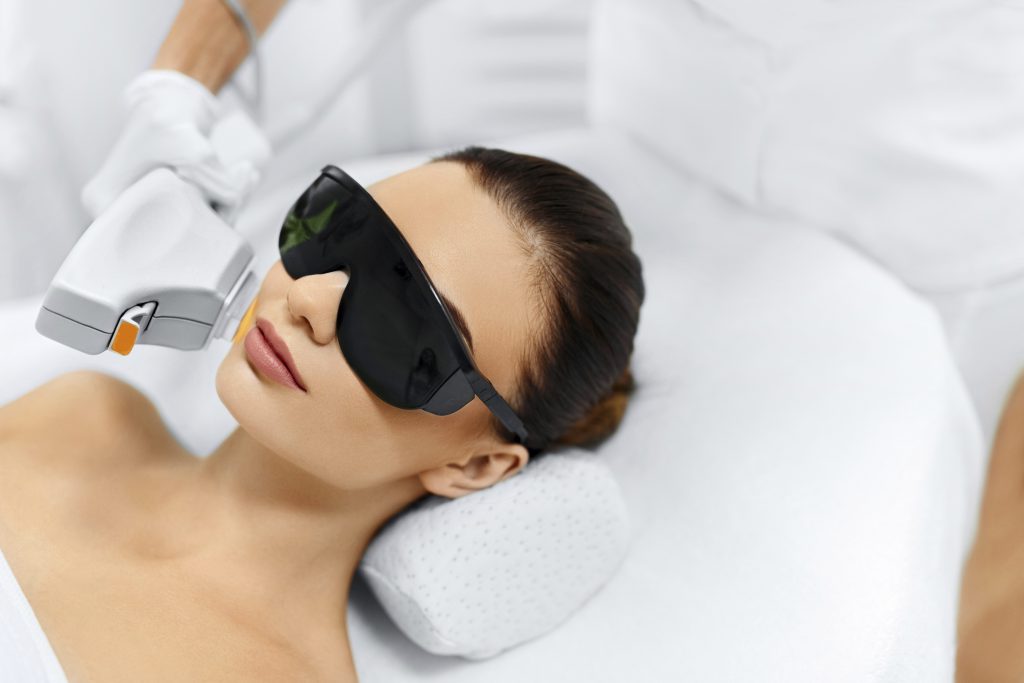With regulations around IPL and laser remaining undefined in much of Australia, Ella Bache is taking matters into its own hands. Sally Hunwick talks to Ella Bache’s Head of Education, Jennifer Hayes about the brand’s new Grad Certificate for IPL and laser hair reduction – and the problems that can arise for a therapist working in this unregulated landscape.

First, lets talk about the booming arena of IPL and laser. With technology getting more advanced by the day, and hair removal practically a national pastime, it follows that IPL and laser hair removal are increasingly asked-for treatments in Australian salons.
“Hair reduction in all forms is still the most popular treatment in salons today,” says Jennifer Hayes, Ella Bache Head of Education. “The use of IPL and Laser for cosmetic purposes for both men and women has grown exponentially in the last 15 years and has made the market very competitive.”
But the reality of what’s going on inside some premises in this unchartered, un-lawed and at the same time booming landscape of IPL and laser is worrying at best. ARPANSA (the Australian Radiation Protection and Nuclear Safety Agency) lists the use of IPL and Lasers by underqualified operators and inappropriate use as the number one cause of injuries in salons and clinics in Australia. Done well, these treatments are a fantastic offering to clients, done poorly and issues such as burns, blistering, scars, increased hyper/hypo pigmentation and eye damage are a very real danger.
“The significant increase in popularity of these treatments has unfortunately given opportunity for rogue operators, buying cheap, unbranded devices online and performing treatments with little or no training,” says Hayes.
Currently, in terms of regulations, things are less than perfect. NSW, VIC, NT and SA remain without any legislation at all around laser and IPL (Queensland meanwhile is one of the country’s most highly regulated states for laser licensing). This lack of legislation essentially means anybody wielding a piece of equipment is allowed to use it – and at the moment it’s hard for unsuspecting clients to know who’s the real deal, and who is not. But things are likely to change, and soon.
“Regulation, currently pending, will require both a formal qualification and supervised training once ARPANSA recommendations from recent studies and consultations are endorsed,” says Hayes. Which is where Ella Bache’s new nationally recognised graduate certificate comes into play.
“This qualification is for therapists who wish to apply their substantial knowledge and skills to design and safely apply non-ionising radiation treatments using IPL and Laser technologies, to reduce unwanted hair on the face and body,” says Hayes.
“By introducing our Graduate Certificate in IPL and Laser Hair Reduction we hope to ensure that all of our students and therapists learn the crucial fundamentals of the skin along with comprehensive training in the technologies and the safety protocols surrounding them.”

Ella Baché has always had a strong commitment to education and a belief that “skin solutions are as individual as you are”. And while Hayes recognises that, like skin, no two technologies are exactly the same, she says that having sound knowledge of the technology and an understanding industry standards puts a professional in good stead; both for now and for later.
“While specific device and manufacturer training is always recommended, by achieving our Graduate Certificate, students can be sure they have a nationally recognised qualification that maps to the Australian and New Zealand Standards, radiation authorities’ recommendations, and industry leader consultation,” says Hayes. “Regardless of any impending regulations, any beauty therapist wanting to provide these treatments should undertake this [Ella Bache] qualification.”
With monthly intakes, the course, which launches in October, runs for 14 weeks full-time or 24 weeks part-time. This includes one day a week at Ella Bache’s state-of-the-art North Sydney campus.
“The course [involves the] equivalent of three days per week of study, including, one day a week attendance at our North Sydney College for practical training, one day for self-paced online learning and assessment preparation, and one day of in-salon experience,” says Hayes. “The work experience component requires at least 100 hours of work in a salon providing treatments to clients with laser or IPL devices for hair reduction. The assessment preparation and work experience components are flexible aspects of the course which may be adjusted, depending on one’s individual circumstances.”

When it comes to what students will learn, Hayes says students will be able to design indiviudal treatments, evaluate and make high level decisions in the treatment room.
“Students will learn to design and evaluate IPL and laser hair reduction treatment programs, making complex, high level, independent judgements in consulting with clients and analysing their skin and hair characteristics,” says Hayes.
With the rise and rise of these new hair removal technologies, it does beg the question whether waxing will become a thing of the past. But Hayes says no.
“There are skin types, hair colours and areas (such as the eyebrows) that IPL and laser cannot treat,” says Hayes. “Even if the technology develops so that these can be treated, it ultimately comes down to the client’s personal preference.”
Even though at the moment, you do not legally need a certificate on your salon wall to perform treatments in IPL and laser hair reduction, Hayes says that proper training is the best way to ensure safe practice.
“This qualification will help therapists gain an in-depth understanding of skin types, hair growth, the technology and how to operate these IPL and laser devices safely and effectively to get maximum results without adverse effects for their clients.”
So if you’re reading this with the niggling feeling you should really hit the IPL and laser hair removal books, now is definitely your moment.
“Now more than ever, it’s important for therapists to hold the Graduate Certificate in IPL and Laser Hair Reduction in order to provide their clients with the peace-of-mind that they are being treated by a therapist that has been assessed to the national standard,” says Hayes. “To be able to promote IPL and Laser Hair reduction treatments conducted by properly qualified therapists will help a salon stand out in this competitive marketplace.”
One thought on “Are you qualified in IPL and laser hair removal? Now’s your moment.”
Leave a Reply
You must be logged in to post a comment.


It is important that the therapist. a nurse or medical physician has enough knowledge and skills doing any cosmetic medical procedure. Nowadays, cosmetic dermal science is the very competitive industry. If you want to become a certified cosmetic nurse, enroll in registered training organization.